One of the best Surgical Disposables company. I am dealing with them for the past 5 years,
their products are world-class. Their approach to trade is professional. All the best wishes to
them.
Navigating Medical Waste Disposal: Guidelines, Compliance Standards, and Sustainable Solutions
- By: Plasti Surge Industries
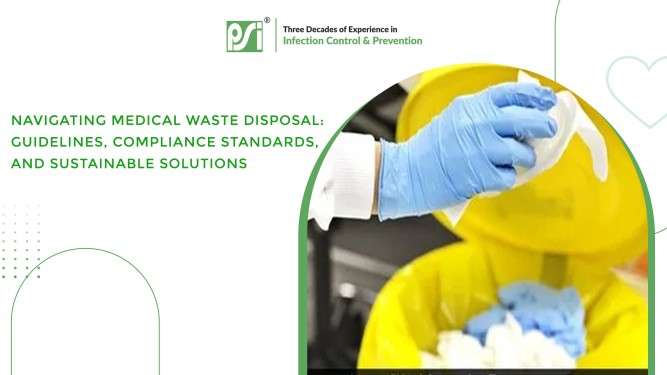
Medical waste encompasses materials generated during healthcare activities, presenting distinct characteristics that necessitate specialized handling and disposal. This waste category includes potentially infectious materials, sharps, pharmaceuticals, and other items used in medical procedures. Its distinctiveness lies in the potential to harbor pathogens, making proper disposal crucial for preventing public health risks. Adhering to stringent Medical Waste Disposal Guidelines is imperative to ensure the safe and environmentally responsible management of these materials, safeguarding healthcare professionals, communities, and the ecosystem from potential harm.
The safe handling and disposal of medical waste play a pivotal role in averting environmental hazards and protecting public health. Improper disposal can lead to the spread of infectious diseases, posing a direct threat to healthcare workers, patients, and communities. Additionally, the potential contamination of water sources and soil further amplifies environmental risks. Adhering to stringent guidelines ensures that medical waste is treated and disposed of appropriately, minimizing the potential for disease transmission and mitigating environmental impact. Prioritizing the safe disposal of medical waste is an integral component of responsible healthcare practices and environmental stewardship.
Types of Medical Waste
|
MEDICAL WASTE TYPE |
DESCRIPTION |
DISPOSAL REQUIREMENTS |
|
Biohazardous Waste |
Includes blood-soaked bandages, tissues, and other materials contaminated with infectious agents. |
- Segregate at the source. - Use biohazard-labeled containers. - Autoclave or incinerate for complete destruction. |
|
Sharps Waste |
Needles, syringes, and other sharp objects used in patient care. |
- Place in puncture-resistant containers. - Dispose of through appropriate channels, often incineration. |
|
Pharmaceutical Waste |
Expired or unused medications, including drugs and vaccines. |
- Separate from other wastes. - Follow guidelines for drug disposal or return to suppliers. |
|
Chemical Waste |
Hazardous chemicals used in medical procedures, like laboratory reagents. |
- Segregate based on chemical properties. - Comply with local regulations for hazardous waste disposal. |
Adhering to these safe handling and disposal guidelines for different types of medical waste ensures the protection of both healthcare workers and the environment.
Compliance Standards for Medical Waste Disposal: A Global Imperative
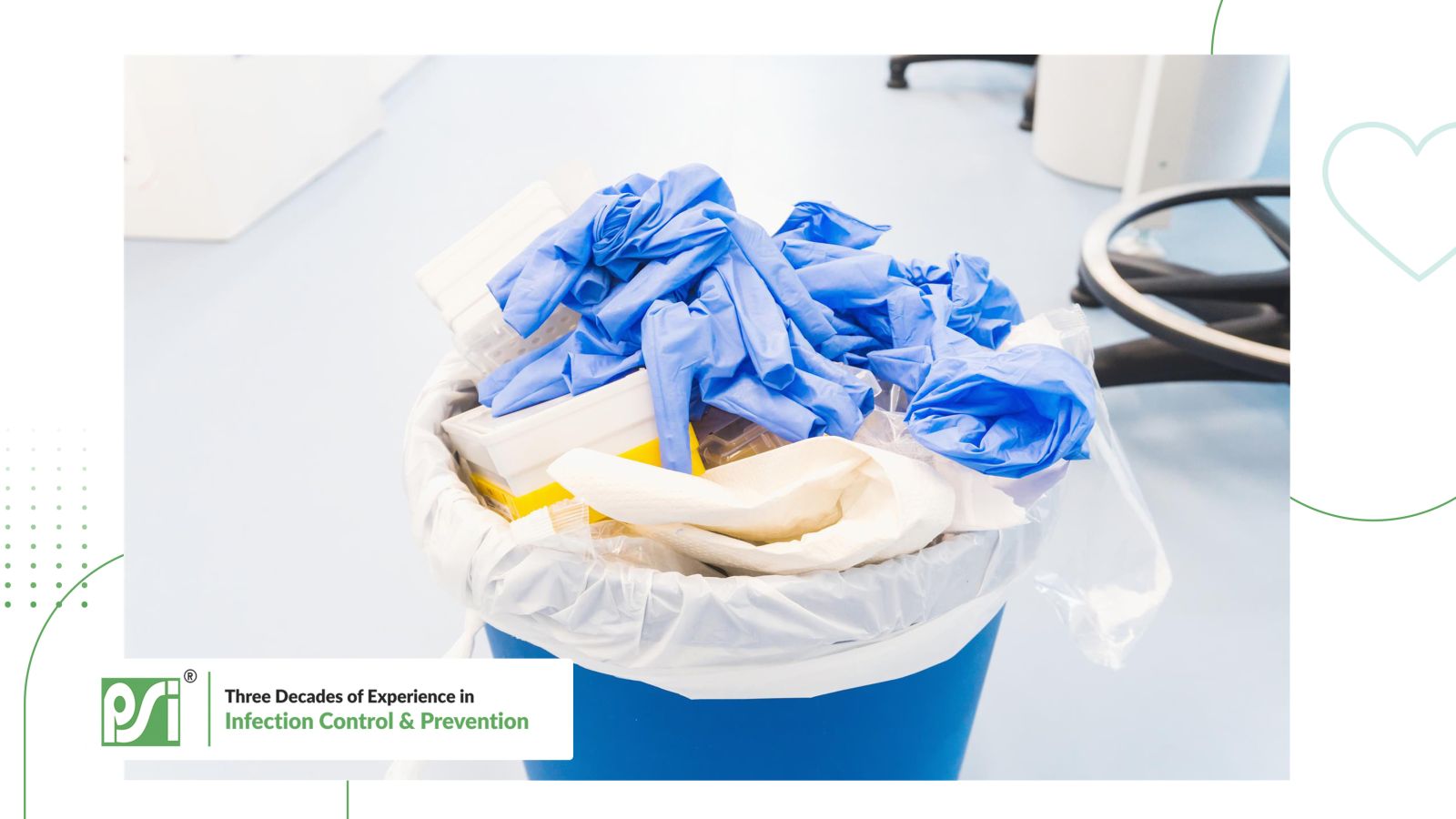 Medical waste disposal is governed by a web of comprehensive national and international regulations to ensure responsible management. In the United States, the Environmental Protection Agency (EPA) enforces regulations under the Resource Conservation and Recovery Act (RCRA). Internationally, the Basel Convention sets guidelines for the transboundary movement of hazardous waste. Non-compliance with these stringent standards bears severe consequences. Healthcare facilities failing to adhere to regulations may face substantial fines, legal actions, or, in extreme cases, facility closures. The repercussions extend beyond financial penalties, as improper disposal poses a direct threat to public health by increasing the risk of infectious diseases.
Medical waste disposal is governed by a web of comprehensive national and international regulations to ensure responsible management. In the United States, the Environmental Protection Agency (EPA) enforces regulations under the Resource Conservation and Recovery Act (RCRA). Internationally, the Basel Convention sets guidelines for the transboundary movement of hazardous waste. Non-compliance with these stringent standards bears severe consequences. Healthcare facilities failing to adhere to regulations may face substantial fines, legal actions, or, in extreme cases, facility closures. The repercussions extend beyond financial penalties, as improper disposal poses a direct threat to public health by increasing the risk of infectious diseases.
On the international stage, the Stockholm Convention and regional agreements reinforce the commitment to proper medical waste disposal. Legal implications for non-compliance underscore the global urgency to uphold these standards, emphasizing the shared responsibility to protect both public health and the environment. As nations continue to collaborate on sustainable practices, adherence to compliance standards for medical waste disposal remains a paramount global imperative.
Streamlining Waste Management Processes in Healthcare Facilities: Tips for Efficiency
Efficient waste management in healthcare facilities not only ensures compliance with regulations but also contributes to environmental sustainability. Here are tips to streamline waste management processes:
- Conduct Waste Audits:
Regularly assess the types and volumes of generated waste to identify areas for improvement.
- Implement a Comprehensive Training Program:
Educate healthcare staff on proper waste segregation, handling, and disposal practices.
- Centralized Collection Points:
Designate centralized collection points strategically to facilitate efficient waste segregation at the source.
- Utilize Technology:
Implement tracking systems and software to monitor waste generation, disposal, and compliance.
- Optimize Collection Schedules:
Adjust waste collection schedules based on volume fluctuations to avoid unnecessary pickups.
- Invest in Proper Infrastructure:
Ensure that the facility has sufficient and appropriate waste disposal infrastructure, such as incinerators or autoclaves.
- Collaborate with Waste Management Partners:
Work closely with waste management partners to stay informed about regulatory changes and best practices.
- Regular Training Updates:
Provide ongoing training sessions to keep staff updated on the latest waste management protocols.
- Promote Waste Reduction Initiatives:
Encourage practices that reduce waste generation, such as the use of digital records and the adoption of reusable items.
- Regular Audits and Compliance Checks:
Conduct routine audits to ensure compliance with waste management regulations and identify areas for improvement.
- Emergency Preparedness:
Develop and regularly update emergency plans for the safe and efficient management of unexpected increases in medical waste.
- Community Engagement:
Engage with the local community to raise awareness of proper waste disposal practices and involve them in sustainability initiatives.
By incorporating these tips into their waste management strategy, healthcare facilities can not only enhance efficiency but also contribute to a safer, more sustainable healthcare environment.
Streamlining Waste Management Processes in Healthcare Facilities: Tips for Efficiency
Efficient waste management in healthcare facilities not only ensures compliance with regulations but also contributes to environmental sustainability. Here are tips to streamline waste management processes:
1. Conduct Waste Audits:
- Regularly assess the types and volumes of generated waste to identify areas for improvement.
2. Implement a Comprehensive Training Program:
- Educate healthcare staff on proper waste segregation, handling, and disposal practices.
3. Centralized Collection Points:
- Designate centralized collection points strategically to facilitate efficient waste segregation at the source.
4. Utilize Technology:
- Implement tracking systems and software to monitor waste generation, disposal, and compliance.
5. Optimize Collection Schedules:
- Adjust waste collection schedules based on volume fluctuations to avoid unnecessary pickups.
6. Invest in Proper Infrastructure:
- Ensure that the facility has sufficient and appropriate waste disposal infrastructure, such as incinerators or autoclaves.
7. Collaborate with Waste Management Partners:
- Work closely with waste management partners to stay informed about regulatory changes and best practices.
8. Regular Training Updates:
- Provide ongoing training sessions to keep staff updated on the latest waste management protocols.
9. Promote Waste Reduction Initiatives:
- Encourage practices that reduce waste generation, such as the use of digital records and the adoption of reusable items.
10. Regular Audits and Compliance Checks:
- Conduct routine audits to ensure compliance with waste management regulations and identify areas for improvement.
11. Emergency Preparedness:
- Develop and regularly update emergency plans for the safe and efficient management of unexpected increases in medical waste.
12. Community Engagement:
- Engage with the local community to raise awareness of proper waste disposal practices and involve them in sustainability initiatives.
By incorporating these tips into their waste management strategy, healthcare facilities can not only enhance efficiency but also contribute to a safer, more sustainable healthcare environment.
Sustainable Approaches to Medical Waste Management: Embracing Eco-Friendly Alternatives
In the pursuit of environmentally responsible healthcare practices, healthcare facilities can adopt sustainable approaches to medical waste management. Consider the following eco-friendly alternatives:
1. Sterilization and Recycling:
- Explore sterilization methods that allow certain medical items to be safely recycled, reducing overall waste.
2. On-Site Treatment Systems:
- Invest in on-site treatment systems, such as autoclaves, that sterilize and render medical waste non-hazardous.
3. Biodegradable Packaging:
- Opt for biodegradable and compostable packaging materials for items that cannot be recycled.
4. Reusable Sharps Containers:
- Introduce reusable sharps containers to minimize single-use plastics and reduce environmental impact.
5. Pharmaceutical Take-Back Programs:
- Establish pharmaceutical take-back programs to safely collect and dispose of unused medications, preventing water contamination.
6. Waste-to-Energy Technologies:
- Explore waste-to-energy technologies that convert medical waste into energy, offering a sustainable disposal method.
7. Comprehensive Recycling Initiatives:
- Implement comprehensive recycling programs for non-contaminated materials like plastics and glass used in healthcare settings.
8. Green Procurement Practices:
- Prioritize purchasing environmentally friendly medical supplies and equipment, contributing to a reduction in overall waste.
9. Community Engagement Programs:
- Engage with the local community to educate and encourage responsible disposal practices, fostering a culture of sustainability.
10. Compliance with E-Waste Regulations:
- Ensure proper disposal of electronic medical equipment in compliance with e-waste regulations, preventing harmful electronic waste.
By incorporating these sustainable approaches, healthcare facilities can minimize their environmental footprint, promote a circular economy, and contribute to a healthier planet while upholding high standards of patient care.
Embracing Sustainability in Healthcare: A Prescription for Positive Change
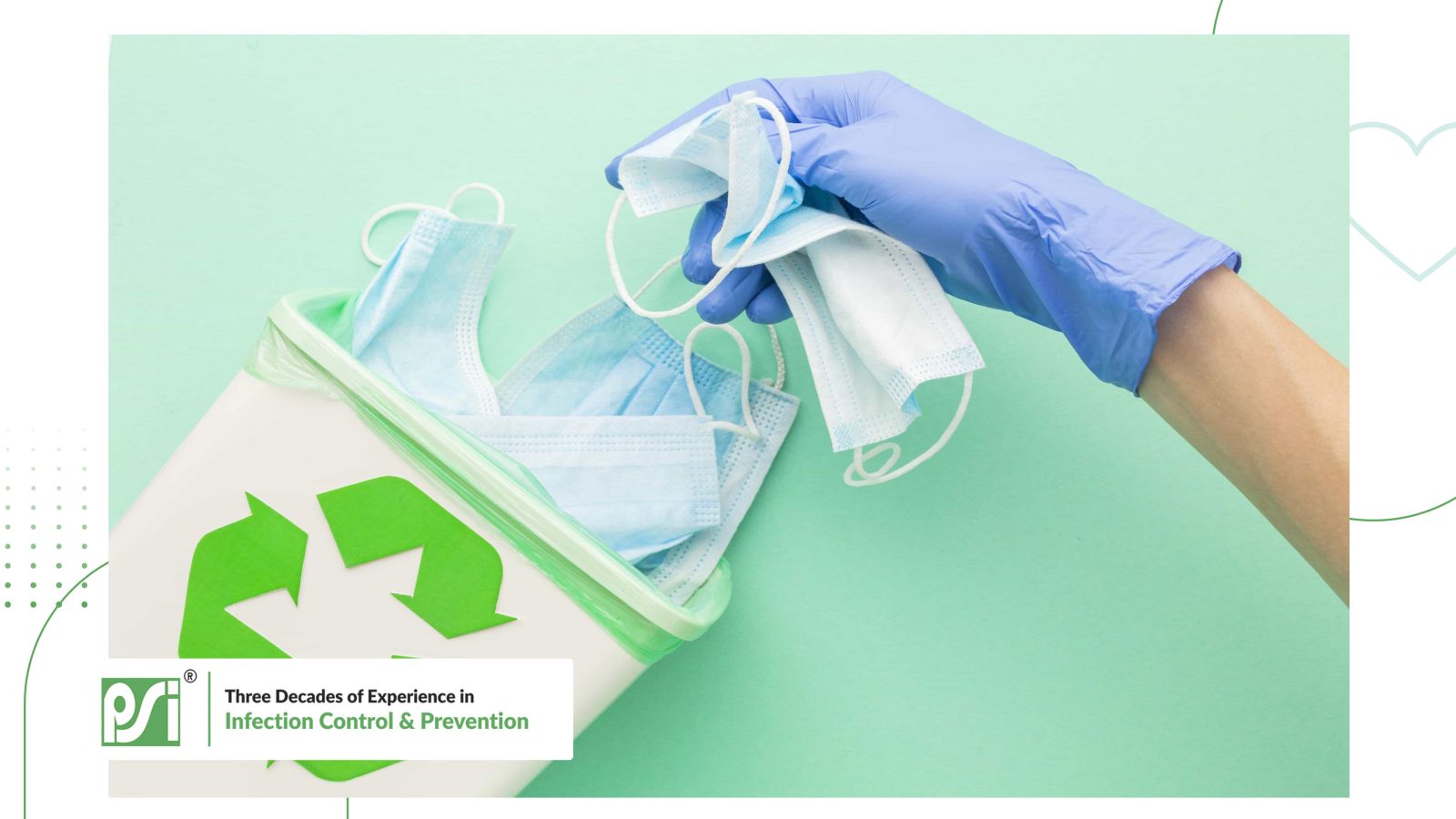 Adopting sustainable practices in healthcare settings offers a multitude of benefits, creating a ripple effect that extends beyond the confines of medical facilities. Here are the key advantages:
Adopting sustainable practices in healthcare settings offers a multitude of benefits, creating a ripple effect that extends beyond the confines of medical facilities. Here are the key advantages:
1. Environmental Conservation:
- Reduces the ecological footprint by minimizing resource consumption, lowering energy usage, and decreasing overall waste production.
2. Public Health Protection:
- Mitigates the impact of hazardous waste on public health, preventing the spread of infections and reducing potential harm to communities.
3. Cost Savings:
- Enhances operational efficiency, leading to reduced waste disposal costs, energy consumption, and expenses related to single-use items.
4. Enhanced Reputation:
- Boosts the reputation of healthcare institutions by showcasing a commitment to environmental stewardship and responsible corporate citizenship.
5. Patient and Staff Well-being:
- Fosters a healthier environment for patients and healthcare professionals, aligning with the core mission of healthcare to promote well-being.
6. Regulatory Compliance:
- Ensures compliance with evolving environmental regulations, safeguarding institutions from legal consequences and reputational risks.
7. Innovation and Research Opportunities:
- Stimulates innovation in sustainable healthcare practices, paving the way for research and development opportunities that benefit the entire industry.
8. Employee Satisfaction and Engagement:
- Fosters a positive work environment, engaging employees in sustainable initiatives and instilling a sense of pride in contributing to a greener future.
9. Community Connection:
- Strengthens ties with local communities through community engagement programs, promoting health education, and contributing to broader sustainable development goals.
10. Long-Term Cost Reduction:
- Invests in long-term cost reduction strategies by focusing on preventive measures, reducing the need for constant resource replenishment and waste management.
11. Resilience to Climate Change:
- Positions healthcare facilities as resilient entities by adapting to and mitigating the effects of climate change through sustainable practices.
By embracing sustainability, healthcare settings can redefine their role as guardians of both individual health and the health of the planet, ultimately contributing to a more resilient, responsible, and compassionate healthcare landscape.
Innovative Approaches to Sustainable Medical Waste Disposal: Pioneering Solutions for a Greener Future
As healthcare facilities increasingly recognize the importance of sustainable practices, several emerging technologies and methods are reshaping the landscape of medical waste disposal. These groundbreaking solutions not only align with stringent Medical Waste Disposal Guidelines and Compliance Standards but also prioritize the safe handling and disposal of medical waste, minimizing environmental impact.
1. On-Site Sterilization Systems:
- Advanced on-site sterilization technologies, such as autoclaves, empower healthcare facilities to treat medical waste in-house. This not only ensures compliance with disposal standards but also reduces the carbon footprint associated with transportation to off-site facilities.
2. Waste-to-Energy Conversion:
- Waste-to-energy technologies are gaining traction, allowing medical waste to be converted into energy through controlled incineration processes. This innovative approach not only adheres to safe handling practices but also harnesses the potential of medical waste as a valuable energy resource.
3. Chemical Decomposition:
- Chemical decomposition methods, utilizing environmentally friendly agents, break down medical waste into non-hazardous components. This approach offers a sustainable alternative to traditional disposal methods while meeting strict compliance standards.
These emerging solutions exemplify a commitment to redefining medical waste disposal practices. By integrating these technologies, healthcare facilities can effectively contribute to a circular economy, reduce environmental impact, and set new benchmarks for sustainable healthcare waste management.
Exemplary Healthcare Facilities: Transforming Waste Management with Success Stories
Several healthcare facilities have demonstrated commendable strides in implementing effective medical waste disposal strategies, aligning with Medical Waste Disposal Guidelines, and Compliance Standards, and prioritizing the safe handling and disposal of medical waste. These success stories highlight transformative outcomes in before-and-after scenarios:
1. Reduction in Volume and Costs:
- A renowned hospital implemented comprehensive waste segregation practices, reducing the volume of medical waste significantly. This not only adhered to Compliance Standards but also resulted in substantial cost savings associated with waste disposal.
2. On-Site Sterilization Implementation:
- By investing in on-site sterilization systems, a medical center drastically reduced its reliance on external waste disposal services. This innovative approach not only met Compliance Standards but also led to a remarkable decrease in transportation-related emissions.
3. Sustainable Packaging Initiatives:
- A healthcare facility adopted eco-friendly, biodegradable packaging for medical supplies, complying with Compliance Standards and prioritizing environmental sustainability. This shift showcased a tangible reduction in the facility's ecological footprint.
4. Community Engagement for Proper Disposal:
- Through community education programs, a hospital encouraged proper disposal practices among staff and patients. This initiative not only ensured compliance with Medical Waste Disposal Guidelines but also contributed to a safer, more informed community.
These success stories underline the positive impact of strategic waste management. By adhering to guidelines, and compliance standards, and prioritizing safe disposal practices, these healthcare facilities have not only achieved regulatory alignment but also showcased tangible benefits in terms of cost savings, environmental sustainability, and community engagement.
Navigating Challenges in Medical Waste Disposal: Practical Solutions for Enhanced Compliance
Medical waste disposal presents unique challenges for healthcare facilities, necessitating proactive solutions to ensure adherence to Compliance Standards. Addressing these challenges head-on is crucial for improving overall waste management efficiency. Here are common hurdles and practical solutions:
1. Inadequate Staff Training:
- Challenge: Insufficient training on Compliance Standards and safe handling practices.
- Solution: Implement regular and comprehensive training programs to educate healthcare staff on proper waste segregation, handling, and disposal protocols.
2. Limited Resources for On-Site Treatment:
- Challenge: Healthcare facilities may lack resources for on-site sterilization systems.
- Solution: Collaborate with waste management partners to explore cost-effective on-site treatment options or invest in community-based sterilization facilities.
3. Inconsistent Segregation Practices:
- Challenge: Inconsistent waste segregation at the source can lead to compliance issues.
- Solution: Implement clear and accessible guidelines, utilize color-coded bins, and conduct regular audits to reinforce proper segregation practices.
4. Technological Integration Challenges:
- Challenge: Integrating new technologies for waste tracking and compliance can be complex.
- Solution: Provide training and support for the seamless adoption of technological solutions, ensuring staff familiarity and compliance.
5. Cost Constraints for Sustainable Practices:
- Challenge: Limited budgets may hinder the adoption of sustainable waste management practices.
- Solution: Prioritize investments based on long-term benefits, explore partnerships with environmentally conscious suppliers, and consider the potential cost savings from sustainable practices.
6. Community Awareness and Engagement:
- Challenge: Limited community awareness about proper disposal practices.
- Solution: Engage in community education programs to raise awareness, involve residents, and create a sense of shared responsibility for proper waste disposal.
By proactively addressing these challenges, healthcare facilities can not only enhance compliance with standards but also foster a culture of continuous improvement in waste management practices, ensuring a safer and more sustainable healthcare environment.
Empowering Communities: Fostering Awareness for Safer Medical Waste Disposal
The proper disposal of medical waste is not just a responsibility of healthcare professionals; it requires collective efforts from the entire community. Understanding and adhering to Compliance Standards for medical waste disposal is crucial for maintaining public health and environmental safety. Healthcare professionals, patients, and the general public play pivotal roles in ensuring the safe handling and disposal of medical waste.
Healthcare Professionals:
Educating healthcare professionals on Compliance Standards is paramount. Regular training programs can reinforce proper waste segregation, disposal procedures, and the importance of adhering to guidelines. By fostering a culture of awareness within healthcare facilities, professionals can become ambassadors for safe medical waste management, influencing positive practices in their communities.
Patients:
Patients are integral stakeholders in the healthcare journey. Providing informational materials in waiting areas and online platforms can educate patients on the significance of proper medical waste disposal. Simple instructions on segregating waste at home, especially for items like sharps or unused medications, can contribute to a safer community environment.
General Public:
Community awareness programs are essential to bridge the knowledge gap about medical waste disposal. Public campaigns, workshops, and accessible online resources can inform the general public about Compliance Standards and safe handling practices. Engaging local authorities, schools, and community organizations can amplify the impact, fostering a collective commitment to responsible waste disposal.
Educational resources, including brochures, online guides, and awareness campaigns, serve as valuable tools. These resources should emphasize not only the legal and environmental aspects but also the tangible impact that each individual can make in maintaining a clean, safe, and compliant community. By empowering all stakeholders with knowledge, we can collectively contribute to a healthier and more sustainable future.
Charting the Future: Trends and Innovations in Sustainable Medical Waste Disposal
The landscape of medical waste disposal is undergoing a transformative shift, marked by advancements and trends that not only align with rigorous Medical Waste Disposal Guidelines but also pave the way for a sustainable healthcare future. One noteworthy trend is the integration of cutting-edge technologies, such as RFID tracking and IoT devices, revolutionizing the monitoring and disposal of medical waste. Real-time data analytics not only ensures strict compliance with guidelines but also enhances the efficiency and safety of waste management processes.
Another promising avenue is the exploration of waste-to-energy solutions, where medical waste is harnessed as a valuable resource for energy generation. This dual-purpose approach not only reduces waste but also contributes to sustainable energy practices. Additionally, the adoption of eco-friendly packaging for medical supplies is gaining traction, emphasizing the commitment to Compliance Standards while minimizing the environmental impact of waste.
At PSI Disposal, we're at the forefront of these advancements, championing sustainable approaches to medical waste management. We believe in continuous improvement as the linchpin for a greener and healthier tomorrow. Join us in this mission by staying informed about the latest trends, innovations, and best practices in medical waste disposal. Together, let's forge a sustainable path forward for the healthcare industry.
Explore the Future. Embrace Sustainability. Visit PSI Disposal for insights into cutting-edge medical waste solutions and be a catalyst for positive change in waste management practices.
One of the best companies to partner with. Very responsive and best product quality.
Good experience and corporation for many years. Timely services are provided.
We have been associated with PSI since more than 20 years now. They have superior products, prompt service & courteous people. Using PSI’s products in turn makes our customer happy and helps us to do more business. Overall truly delighted with their customer service.




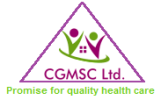

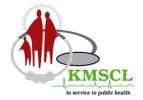



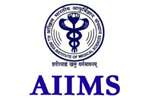



_iCEz.jpeg)
 +91-7798800781
+91-7798800781
o6gfpdvr.jpg)





